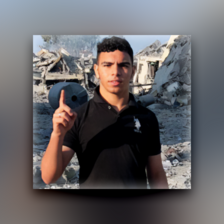The Electronic Intifada 8 July 2024

The school in Nuseirat refugee camp which Israel attacked on Saturday 6 July.
APA imagesIt is a month since one of the most horrifying massacres during the current genocide in Gaza.
More than 270 Palestinians were killed in the 8 June attack on Nuseirat refugee camp.
As Israel presented the assault as a successful operation to rescue four captives, hearing from people with a direct experience of the violence remains essential.
Abd al-Rahman, 22, went to the roof of his home in Nuseirat when he heard loud noises nearby.
He immediately told his mother Nour that the Israeli military was approaching in tanks. “We must leave now,” he said.
Nour instructed the family to grab the bags they had already packed for emergencies and head for their grocery store in the center of the camp. She felt that the store would be safer than their home.
Two of Nour’s children went first. Nour and Abd al-Rahman set out shortly after them.
The journey to the store was terrifying.
Israel was attacking the camp from both the air and the ground. Buildings were being destroyed.
When Nour made it to the store, she could not find Tasneem, her 14-year-old daughter.
As Tasneem had set out ahead of her mother “she should have been here before us,” Nour said.
Nour became increasingly worried. She wanted to leave the store and search for Tasneem but her other children held her back; it was too dangerous.
About three hours later, Tasneem arrived with her uncle.
It transpired that Tasneem had been waiting on the street so that she could help her mother to carry the bags from their home. She had expected her mother to see her while heading toward the store.
But Nour had taken a different route than she normally would have to try and avoid being hit by a shell or a missile.
It was a major relief to be reunited with Tasneem. The mother and daughter hugged each other as if it had been a few years, rather than a few hours, since they had last seen each other.
As the family took shelter in the store, Nour lacked information about the full extent of what was happening. Eventually, she learned from neighbors that Israel had killed and injured a huge number of people.
Extreme pain
Nour waited until the next morning before going back to her home. It was full of dust and debris.
She took a broom and began sweeping and cleaning the house. Suddenly, she found herself flying through the air before crashing down on her back.
She was in extreme pain and bewildered by what had just happened.
It transpired that Israel had just attacked a neighboring building.
Nour’s children brought her to al-Aqsa Martyrs Hospital in the nearby city of Deir al-Balah. To bring her there, they needed the wheelchair used by their grandmother.
At the hospital, a doctor established that Nour had a fractured pelvis.
As there were no beds available in the hospital, Nour’s family were asked to bring her a mattress from home.
With Gaza’s healthcare system nearing collapse, Nour needs specialized treatment abroad.
Like thousands of others, Nour cannot be evacuated from Gaza. The Rafah crossing – the entry and exit point between Gaza and Egypt – has been closed since Israel invaded the surrounding area in May.
Nuseirat refugee camp has witnessed further violence since the 8 June massacre.
On Saturday 6 July, Israel attacked a school run by the United Nations agency for Palestine refugees (UNRWA) in Nuseirat.
At least 16 Palestinians were killed.
Dima Ashour is a writer based in Gaza.




